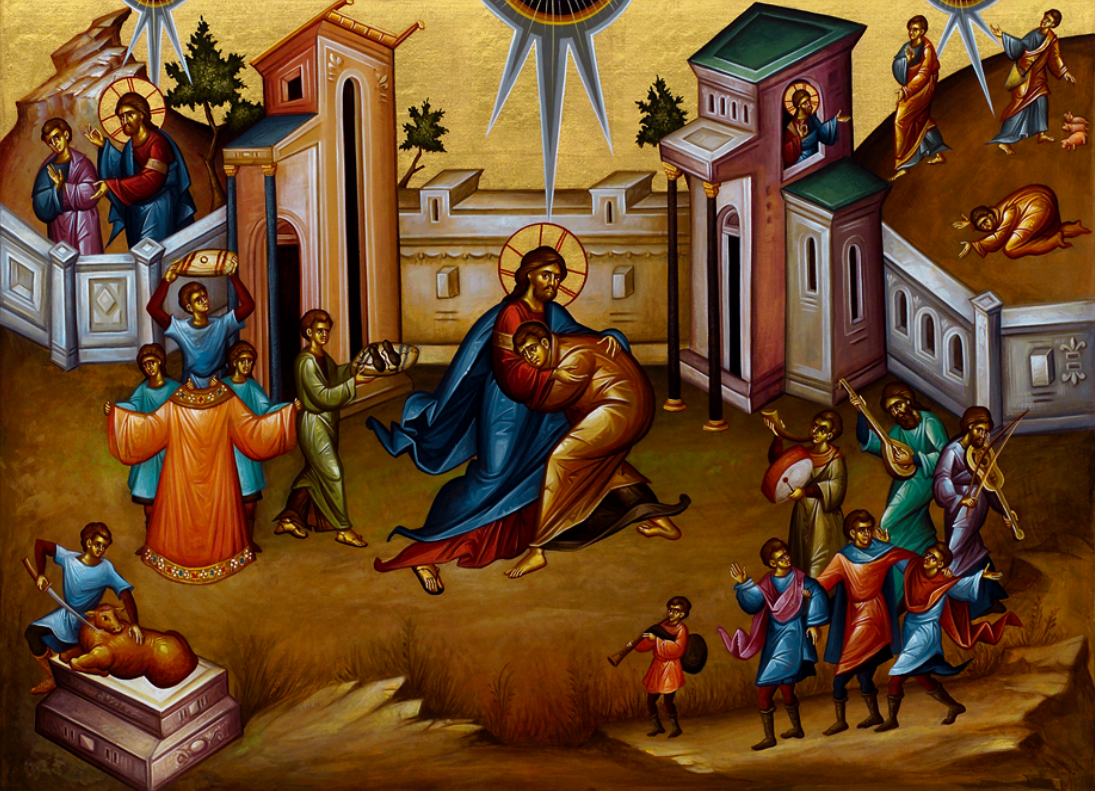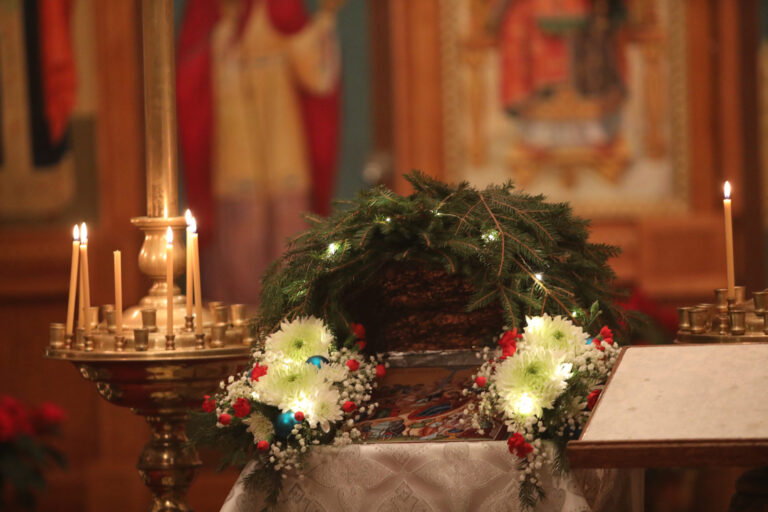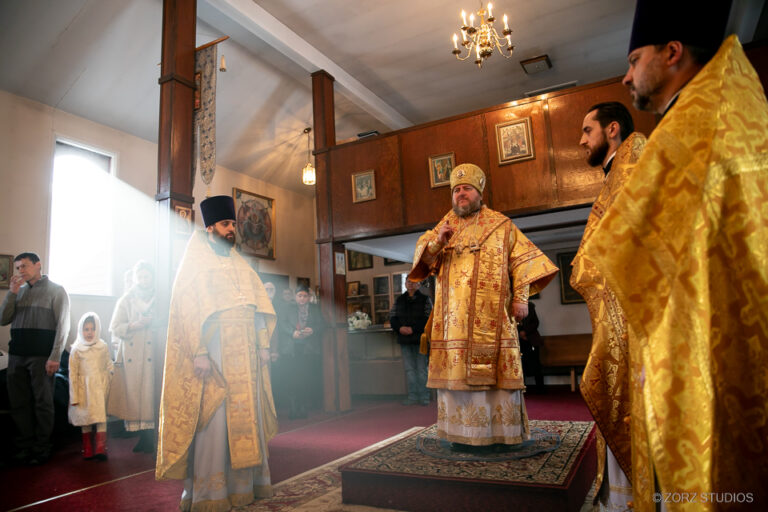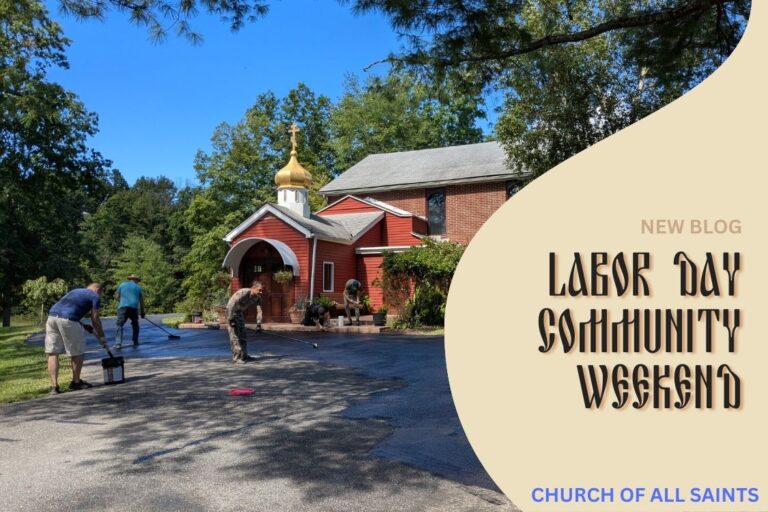When addressing clergy, it is important to have a basic understanding of the priesthood to avoid mistakes.
In Orthodoxy, there are three degrees of priesthood: deacon, priest, and bishop. Before ordination to the diaconate, a candidate must decide whether he will serve as a married priest (white clergy) or take monastic vows (black clergy). Since the last century, the Russian Church has also recognized the institution of celibacy, meaning that ordination is received with a vow of lifelong chastity (“celibate” comes from the Latin word for “unmarried”). Celibate deacons and priests are also considered part of the white clergy. Today, monastic priests serve not only in monasteries but also frequently in urban and rural parishes. However, a bishop must always come from the black clergy.
The hierarchy of priesthood can be presented as follows:
White Clergy (Married) vs. Black Clergy (Monastic)
I. Deaconate
- Deacon
- Protodeacon (senior deacon, usually in a cathedral)
- Hierodeacon (monastic deacon)
- Archdeacon (senior deacon in a monastery)
II. Priesthood
- Priest (Presbyter or Hieros)
- Archpriest (senior priest)
- Hieromonk (monastic priest)
- Hegumen (abbot of a monastery)
- Archimandrite (higher-ranking abbot)
III. Episcopate (Bishopric)
- Bishop
- Archbishop
- Metropolitan
- Patriarch
If a monk takes the Great Schema (the highest monastic rank, known as the “Great Angelic Habit”), the prefix “schema” is added to their title: schema-monk, schema-hierodeacon, schema-hieromonk (or hieroschemamonk), schema-hegumen, schema-archimandrite, and schema-bishop (a bishop in schema must renounce administrative duties).
Addressing Clergy
When speaking to clergy, a neutral and respectful style should be used. Addressing a priest simply as “Father” without a name is either overly familiar or impersonal (it is mainly used among clergy when addressing a group, e.g., “Fathers and brothers, please pay attention”).
The question of whether to use “you” (formal) or “thou” (informal) in addressing clergy is clear—always use the formal “you.” Although in prayers we say “forgive us” and “have mercy on me,” formal address is standard in the church setting. Of course, in close relationships, informal speech may develop, but in public settings, using informal address can be seen as a breach of etiquette. For example, the wife of a deacon or priest naturally speaks to her husband informally at home, but doing so in church would be inappropriate and undermine his authority.
In church tradition, clergy are addressed using the Church Slavonic form of their names. Therefore, one should say “Father Ioann” (not “Father Ivan”), “Deacon Sergius” (not “Deacon Sergey”), “Patriarch Alexy” (not “Aleksey” or “Alexei”).
Addressing a Deacon
A deacon is an assistant to the priest. He does not possess the sacramental grace of a priest, which is conferred through ordination to the presbyterate. Because of this, a deacon cannot independently celebrate the Liturgy, perform baptisms, hear confessions, administer unction, conduct weddings, perform funeral services, or bless homes. Consequently, it is not appropriate to request sacraments or blessings from a deacon. However, a deacon can offer advice and prayers.
The correct way to address a deacon is “Father Deacon.” For example: “Father Deacon, could you tell me where to find the rector?” If asking a clergy member’s name, it is appropriate to say: “Forgive me, what is your holy name?” (this form can be used with any Orthodox Christian).
When using the deacon’s name, it should be preceded by “Father”: “Father Andrei, may I ask you a question?” When referring to a deacon in the third person, say: “Father Deacon told me…” or “Father Vladimir informed me…” or “Deacon Pavel just left.”
Addressing a Priest
In church practice, it is not customary to greet a priest with “Hello.”
A priest introducing himself should say: “Priest Vasily Ivanov,” “Archpriest Gennady Petrov,” or “Hegumen Leonid”; however, it would be incorrect to say, “I am Father Mikhail Sidorov.”
When referring to a priest in the third person, people usually say: “Father Rector has given his blessing” or “Father Mikhail believes…” It sounds unnatural to say, “Priest Fyodor advised.” However, in a multi-cleric parish where priests may have the same name, distinctions are made: “Archpriest Nikolai is on a mission, and Priest Nikolai is administering Communion.” In such cases, the surname may also be added: “Father Nikolai Maslov is currently meeting with the bishop.”
The combination “Father” and the priest’s surname (e.g., “Father Kravchenko”) is rarely used and carries a formal or distant tone.
Knowing these customs is necessary but not always sufficient due to the many different situations that arise in parish life. For instance, how should a layperson behave when among several priests? While there can be many variations, the general rule is to seek blessings first from senior-ranking priests, beginning with archpriests and then priests. If you have already received blessings from two or three priests but there are still more nearby, you should also take their blessings. If this is difficult for some reason, you may say, “Bless, reverend fathers,” and bow. It should be noted that in Orthodoxy, it is not customary to say “holy father”; instead, people say “reverend father” (e.g., “Pray for me, reverend father”).
Another situation: a group of believers in the church courtyard approaches for a priest’s blessing. In this case, men go first (if there are clergy present, they approach first), followed by women, in order of seniority. If a family approaches for a blessing, the husband goes first, then the wife, and then the children (in order of age). If introducing someone to a priest, one should say: “Father Peter, this is my wife. Please bless her.”
How should one act upon meeting a priest in public (on the street, in transport, in a public place such as a mayor’s office or store)? Even if he is in civilian clothing, you may approach him and take his blessing, provided it does not interfere with his activities. If taking a blessing is not possible, a slight bow is appropriate.
Upon parting, as upon meeting, the layperson again asks for the priest’s blessing: “Forgive me, Father, and bless me.”
Greetings Among the Faithful
Since we are all united in Christ, believers address each other as “brother” or “sister.” These forms of address are quite common in church life, though perhaps not as much as in Western Christian traditions. This is also how believers address the congregation: “Brothers and sisters.” These beautiful words express the deep unity of believers, as stated in the prayer: “Unite us all, who partake of the one Bread and one Cup, to one another in the communion of the Holy Spirit.”
In a broad sense, both bishops and priests are also brothers in Christ to laypeople.
In church settings, even elderly people are not addressed with patronymics; they are called by their first names (as when approaching the Eucharist and Christ).
Among the laity, men usually greet each other with a handshake accompanied by a kiss on the cheek, while women exchange greetings without a handshake. Ascetic rules impose restrictions on greetings between men and women that involve kissing; it is sufficient to greet each other with a word and a slight bow. Even on Pascha, reason and moderation should be observed so as not to introduce inappropriate emotionality into the Paschal kiss.
Relations among believers should be marked by simplicity, sincerity, and humble readiness to ask for forgiveness when wrong. A common form of dialogue in church settings is: “Forgive me, brother (sister).” – “God forgives; you forgive me as well.” Upon parting, believers do not say “All the best” as is common in secular settings, but rather “God keep you,” “Pray for me,” “Go with God,” “God’s help be with you,” or “May your guardian angel watch over you.”
In secular settings, people often struggle with how to decline requests without causing offense. In the Church, this issue is resolved simply and effectively: “Forgive me, I cannot agree to this because it is a sin” or “Forgive me, but I do not have a blessing from my spiritual father for this.” This quickly defuses tension—something that would take considerable effort in the secular world.
Behavior in Conversation
A layperson’s attitude toward a priest, as a bearer of grace received in the sacrament of Holy Orders and as one appointed by the Church to shepherd Christ’s flock, should be one of reverence and respect. When conversing with a priest, one should ensure that speech, gestures, facial expressions, posture, and gaze are appropriate and respectful. Speech should not include expressive or crude language or slang. Gestures and facial expressions should be minimal (as restraint in gesturing is a sign of a well-mannered person). One should not touch a priest or behave familiarly. A respectful distance should be maintained, as excessive physical proximity violates norms of both church and secular etiquette. Posture should not be casual or irreverent, and it is inappropriate to sit while a priest is standing; one should sit only after being invited to do so. A gaze, which is often the least controlled aspect of nonverbal communication, should not be piercing, scrutinizing, or ironic. A meek, humble, and lowered gaze immediately reveals a well-mannered and, in this case, a devout person.
One should always strive to listen to others, avoiding excessive talking and verbosity. In conversation with a priest, a believer should remember that God Himself may often speak through His servant. This is why parishioners listen attentively to their spiritual father’s words.
It goes without saying that laypeople should follow the same principles of respectful communication in their interactions with one another.
Written Correspondence
Written communication (letters) is less common than verbal communication, but it still exists in church life and has its own rules. In the past, letter writing was an art, and the epistolary heritage of church writers and even ordinary believers remains an object of admiration today.
The church calendar is filled with feasts, so it is not surprising that the most common letters among believers are greetings for feasts such as Pascha, Christmas, patronal feasts, name days, and birthdays.
Unfortunately, greetings are often sent and received late, which has become a bad habit. While it is understandable that Pascha and Christmas are preceded by lengthy and even exhausting fasting periods, and that the days before these feasts are filled with preparations, these are not valid excuses. One should make it a rule to send and respond to greetings on time.
There are no strict rules for composing holiday greetings, but they should be sincere and filled with love. Some established forms, however, can be noted.
A Paschal greeting begins with “Christ is Risen!” (usually written in red ink) and ends with “Truly, He is Risen!”(also in red).
A Christmas greeting may begin with “Christ is born—glorify Him!” (following the opening of the Nativity Canon: “Christ is born—glorify Him!”).
For name days, one usually wishes the recipient the help and intercession of their heavenly patron.
For a patronal feast, the entire parish is congratulated, including the rector and parishioners. If using a formal tone, clergy should be addressed with the proper ecclesiastical titles: “Your Reverence” (for a deacon, priest, or hieromonk), “Your High Reverence” (for an archpriest, hegumen, or archimandrite). Rarely used today are the older forms of address: “Your High Blessing” for an archpriest and “Your Blessing” for a priest.
These principles should also guide formal speeches and toasts at celebrations, which are frequent in strong parishes where the community lives as one spiritual family.
At the Parish Refectory Table
If you arrive when most people are already seated, take an available seat without causing others to move, or sit where the rector blesses you. If the meal has already begun, ask for forgiveness, say “May an angel be present at the meal,” and take a seat.
Unlike monasteries, parish refectories typically do not have a strict hierarchy of tables (such as first table, second table, etc.). However, the rector or the senior priest sits at the head of the table (or at the perpendicular table if there are multiple rows). To his right sits the next senior priest, and to his left, another priest in order of rank. Close to the clergy sit the parish council president, council members, church staff (psalmist, reader, altar server), and choir members. Honored guests are usually seated closer to the head of the table by the rector’s blessing. In general, the arrangement follows Christ’s teaching on humility at banquets (see Luke 14:7-11).
The structure of parish meals often mirrors that of monasteries: on regular days, a designated reader, standing at the lectern, reads the lives of saints or spiritual teachings aloud after the priest’s blessing, and everyone listens attentively. Festive meals, where name days are celebrated, include spiritual wishes and toasts. Those giving speeches should prepare thoughtful remarks in advance. Moderation is observed in all things: food and drink, conversation, humor, and the length of the gathering. Name day gifts often include icons, books, church items, sweets, or flowers. The honoree thanks everyone at the end of the meal, after which the group sings “Many Years” to them. Praise and gratitude are expressed to those who prepared the meal, but always in moderation, for “the Kingdom of God is not food and drink, but joy in the Holy Spirit.”
Inviting a Priest for Services (Treby)
Sometimes, it is necessary to invite a priest for specific church services, known as treby.
If you know the priest personally, you may invite him by phone. When speaking on the phone or in person, do not greet the priest with “Hello.” Instead, begin the conversation with: “Hello, is this Father Nicholas? Bless me, Father,” and then briefly state the reason for the call. Conclude the conversation with thanks and again ask for a blessing: “Bless me.”
You should also ask the priest or the person at the church candle counter what needs to be prepared for the service. For example:
- For Communion of the sick: Prepare the sick person, clean the room, remove pets, have candles, a clean cloth, and water.
- For Unction (Anointing of the Sick): Prepare candles, cotton swabs, oil, and wine.
- For a Funeral Service: Prepare candles, the absolution prayer, a burial cross, a shroud, and an icon.
- For House Blessing: Prepare candles, vegetable oil, and holy water.
It can be distressing for a visiting priest to see that the family is unprepared or unsure of how to behave. Even worse, if a television is on, music is playing, a dog is barking, or immodestly dressed young people are present.
After prayers, if the situation permits, offering the priest a cup of tea provides a wonderful opportunity for the family to discuss spiritual matters and seek guidance.
The Behavior of Parishioners in Church Service Roles
The behavior of parishioners serving in the church (selling candles, icons, cleaning the church, guarding the grounds, singing in the choir, serving in the altar) is a special topic. The Church places great importance on obedience. Doing everything in the name of God, overcoming one’s old self, is a very difficult task. It is further complicated by the tendency to become overly familiar with holy things, developing a sense of ownership over the church, which can lead to neglecting “outsiders” and visitors. However, the holy fathers never state that obedience is above love. Since God is Love, how can one resemble Him without demonstrating love?
Brothers and sisters serving in churches should be examples of meekness, humility, kindness, patience, and basic courtesy—such as answering phone calls properly. Those who have called churches know how important this is—sometimes, the response can be so unpleasant that they hesitate to call again.
On the other hand, those coming to church must recognize that the Church is a special world with its own rules. One should not enter dressed inappropriately: women should not wear pants, short skirts, no head covering, or lipstick; men should not wear shorts, t-shirts, or short-sleeved shirts, and they should not smell of tobacco. These are matters not only of piety but also of etiquette, as violating norms of behavior may justifiably provoke a negative reaction (even if only inwardly) from others.
To anyone who has had an unpleasant experience at a parish: remember that you came to God. Offer Him your heart, and overcome any temptation through prayer and love.








